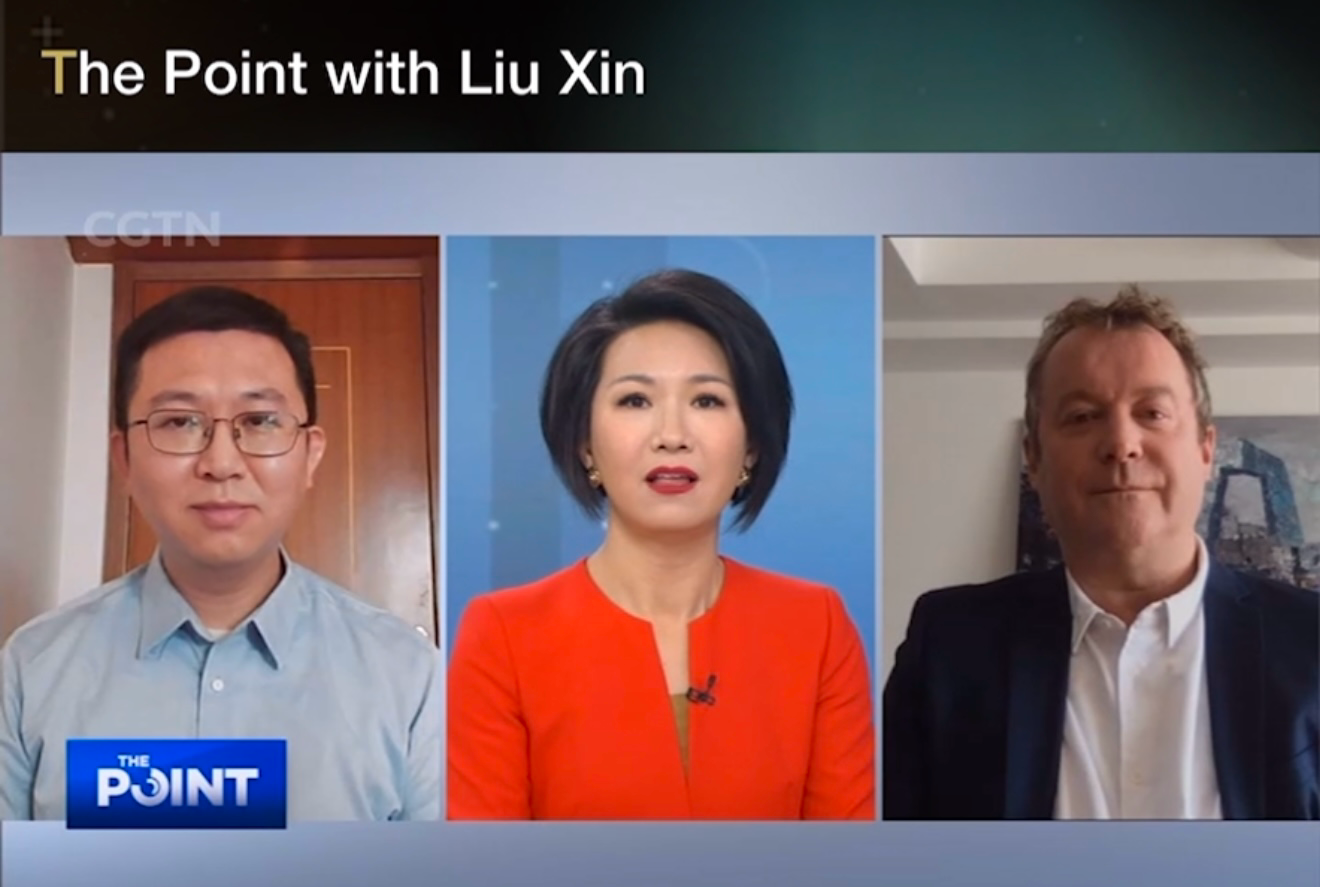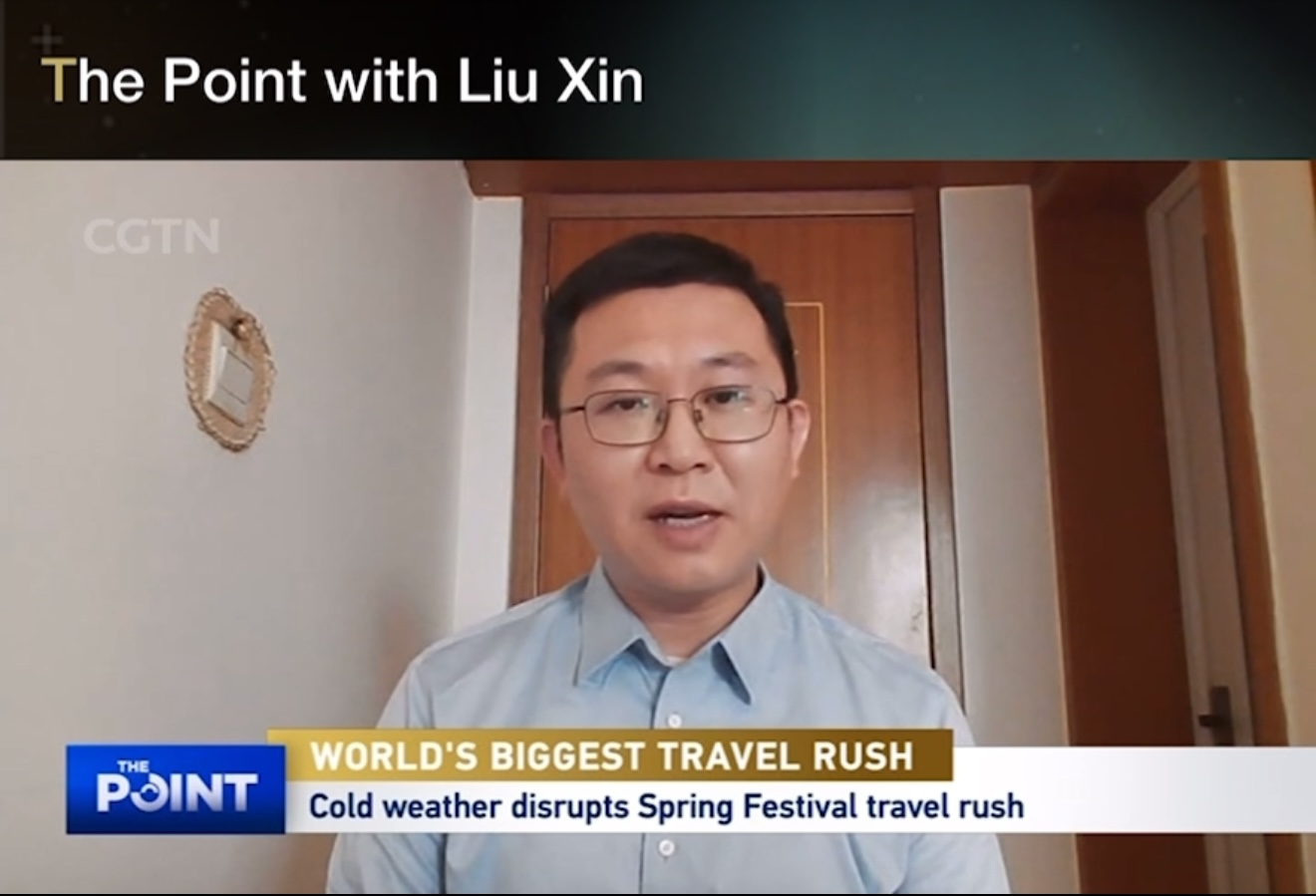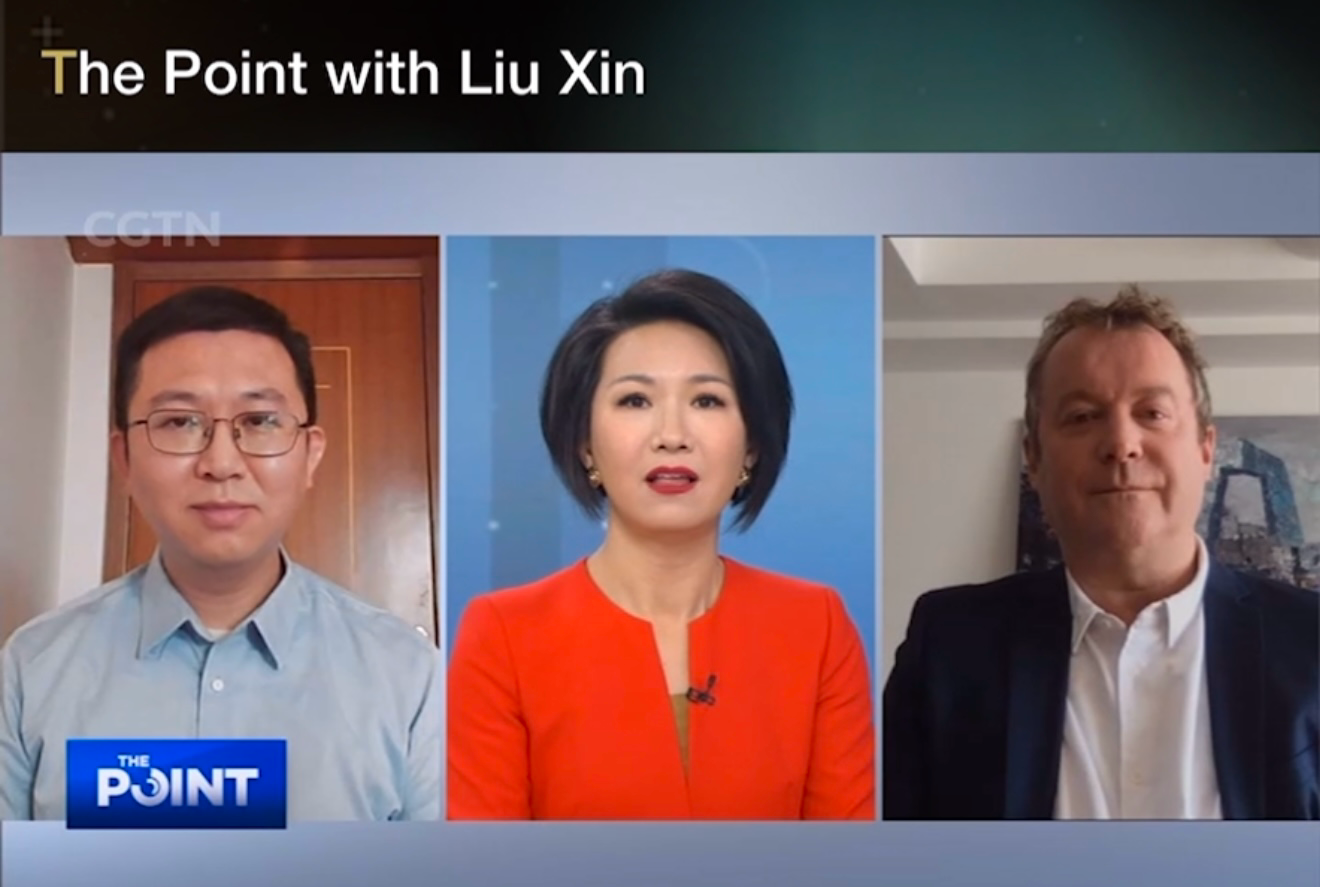Prof. YIN Haitao: On Climate Change Impact During Spring Festival Travel Rush 2025-01-14
YIN Haitao, Professor from Economics Department of Antai College of Economics and Management (ACEM) at Shanghai Jiao Tong University, recently shared his expert insights on CGTN's The Point regarding the intersection of climate change and China's massive Spring Fetival migration.

During the live interview, YIN provided a comprehensive analysis of how extreme weather events are affecting China's transportation infrastructure during the world's largest annual human migration. Drawing from his expertise in environmental economics, he emphasized the growing connection between climate change and travel disruptions.

See original interview transcript:
CGTN:
Freak weather during travel peak. Chinese are on the massive move for the spring festival, but blizzards and sleeks have put a damper on homebound travelers. How does China manage the monumental task? And visitors to China are often stumped by its advanced cashless payment system. Two airports in Beijing are rolling out payment demonstration zones for those in need of help. How far will these zones get those people scanning their way through China? Welcome to The Point, an opinion show coming to you live from Beijing. I'm LIU Xin. Home, sweet home, so close yet so far. With the Chinese Lunar New Year just around the corner, hundreds of millions of Chinese are toiling to join their families for celebrations. The spring festival travel rush, or Chunyun, is the largest annual migration on earth, and this year particularly so. According to China's transport authorities, a record nine billion trips are anticipated during the period, which lasts some 14 days. That's the equivalent of every Chinese traveling six times. And there are a lot of Chinese already. But this year, freak weather events in central China have literally left people out in the cold. Social media is rife with footage of stranded traffic and the Herculean effort to get them back on track. So what makes this year's travel rush particularly phenomenal? How are such emergencies managed in China in the social media age? And how does China handle such a mission? I'm pleased to be joined from Bingzhou, City of East China's Shandong Province by Professor Yin Haitao, Vice Dean of Antai College of Economics and Management at Shanghai Jiao Tong University, and from Beijing by Justin Downs, President of AXIS Leisure Management and International Leisure and Hospitality Management Company and Consultancy. Jenbin, welcome to The Point. So as I said, nine billion trips expected to be made from January the 26th, or end of January, till the beginning of March. Mr. Downs, let me go to you first. Why such a huge numbers for this particularly period of time? Put it into perspective for our international viewers.
Mr. Downs:
Well, nine billion is a compatible number to most people, let alone a million. If you were to walk around the world as a normal person, nine billion steps would be 106 times, or seven billion steps would be 106 times around the earth. That's how many it is. And it's only less than 1% of how many people travel during the US Thanksgiving, which is the biggest travel period of the US as well. So unbelievable numbers, but I think largely it's because for the past few years, of course, we've been going through COVID and a lot of people still were unable to get back to their hometowns in the previous year. So I think the large numbers are really caused by pent up demand to get home and see their families.
Especially for the largest holiday, which is extremely important for the Chinese. Professor Yin, you recently, I understand, traveled from Shanghai, where you work, to Bingzhou City, where you are in Shandong Province, where your home is, I understand, or your parents' home is. How was that travel? Was it smooth and how indicative is that of the kind of challenges that the travel system is faced with around China?
Prof. YIN Haitao:
Thank you. I came back to my hometown on the 4th, this past Monday. So I first took a high speed train from Shanghai, where I work to a nearby city called Dezhou. And then my friend picked me up at the train station. We drive one and a half an hour back to my hometown. You know, due to the bad weather, my train was delayed by one hour. And then that, the trip was quite pleasant.
CGTN:
But around China, on social media, we are seeing footages of stranded cars on highways, delayed high speed rails and so on and so forth. What is your understanding of the disruption, of the scale of disruption that's been happening, that's happening in China, because of the extreme weather patterns?
Prof. YIN Haitao:
Yes, and you know, I heard this from the news report from the social media, from what I learned is quite severe. I see many, many cars, you know, stuck in the highway. You know, the weather is not very friendly, so people suffered. I think, you know, this is a very abnormal, extreme event. You know, we don't see this very often in the last few years, in the last 10 years. Have you wondered why this may be so normal that such, you know, such large-scale disruptions have taken place? You know, I'm an environmental economist, so from my understanding, because, you know, we are experiencing this climate change, because the carbon emission, the global greenhouse gas emission keep increasing, and climate change is approaching. So I would expect in the last few years, we are going to see more and more this extreme weather, extreme event. And probably they will become normal in the future, in some sense.
CGTN:
Mr. Downs, how do you look at the fact that out of the nine billion troops we were talking about, 7.2 billion, that is 80 percent, are being made by people who are driving home, you know, on top of the, you know, the other means of transportation, which were more fashionable or prevalent in the past. Is that another factor that has compounded the kind of disruptions we are seeing?
Mr. Downs:
Well, I mean, sure. I mean, people are taking their cars because it's convenient, and it's perhaps more affordable. They can take their time. They can stop and do things along the way. They can bring their luggage. You know, it would bring lots of gifts, of course. So people want their cars when they get to a destination as well. So they're not kind of reliant on local transport systems. So, yeah, more and more people are getting in their cars and moving. And to be honest, unfortunately, whether the weather is good or not, people are not generally prepared in long-distance travel. They don't do it very often. So it's compounded by the weather, but I think it's also just general lack of practice in this type of travel at this time of year. And a lot of people doing that at the same time, we could exacerbate this problem. How do you look at Mr. Downs, if you're still with us, how do you look at the kind of responses that have been levied out by the authorities, whether it's the local government or the transport authorities, to remedy the kind of disruptions that we're seeing?
Mr. Downs:
I think everybody is inclined to give the local authorities a hard time because, you know, they should have controlled this. But no one can control Mother Nature. I mean, it's beyond everybody's control. So I think they do an admirable job. They probably err a lot on the, you know, more overly cautious than perhaps in other countries there would be. But that's also because I think the lack of preparedness and awareness of the drivers themselves needs to have that. I think, you know, I think that they're generally prepared for emergency response. But I think the, say, preventive maintenance and the equipment readiness and this type of stuff to keep things open and moving is also part of perhaps the future plan is to be better prepared for these types of events.
CGTN:
And this is a particular kind of weather we're talking about, a sleek, which happens very rarely, unfortunately happened during this particular period of time and happened in central China, which is the kind of hub where, you know, a lot of people, a lot of trains, a lot of highways are converging. Mr. Downs, how do you look at the particular challenge that's posed there and the kind of innovativeness that have been demonstrated by various authorities to try to get rid of the, thick, frozen layer of ice on top of roads or, you know, the public infrastructure?
Mr. Downs:
Yeah, look, it's other countries deal with this and have been dealing with it for a long, long time. And the population are more used to their preparedness for it. They have the right type of tires. They've learned how to drive. They know that they've got their sensory awareness about them. The Chinese drivers perhaps haven't had to deal with that so often. And, you know, the landscape of China is immense, right? It takes a lot of equipment and, you know, there's a lot of, you know, procedures, whether it's salting the roads or using other types of, not necessarily harmful chemicals, but types of materials to soften the impact of the ice on the road. But at some times it's really unmanageable, the sheer quantity of it. It's almost like a perfect storm, you might say, where it doesn't matter what you do and how well you're prepared, it's just something that takes time to manage and everybody just needs to be patient.
CGTN:
Professor Yin, what is special about the response that China has rolled out or the Chinese authorities have rolled out with similar, in dealing with similar disasters from other countries, if you have any such experiences abroad, do you think there are any ways unique to China, how they deal with such an emergency situation? Because we are seeing, for instance, PLA soldiers being mobilized to help clear the roads and so on and so forth. And that's a common practice every time there is a natural disaster or emergency of any sort.
Prof. YIN Haitao:
Yeah, exactly. So, apparently for this time, this traffic jam, apparently the local government, they are less prepared. They are not prepared for this because this is an extreme event, abnormal. But from the response, I see quite a effective response. I see from what I learned from the social media, the government organized those massive snow removal actions. They mobilize the government officials, they mobilize the armed police men and women. And also, you know, what I'm quite happy to see is the local residents from nearby villages. They also self-organize. They either volunteer to give out food and drink for free or they engage some sort of market behavior. They sell food and hot water to the people who are stuck on the highway. That's quite helpful.
CGTN:
And Mr. Downs, you just came back from Xinjiang to Beijing by flight, of course. How was that trip? And in other routes that are not so much affected by extreme weather, what's the situation there?
Mr. Downs:
Oh, it was seamless and perfect, actually. I mean, there was beautiful blue skies in Xinjiang and beautiful blue skies here in Beijing. So we had no disruptions. I was traveling with some people who were going to Wuhan. They had a different story. I'm not sure if they made it back there yet or not. But the flights were full. It was full of families. Everybody was happy to be going somewhere. But everything was perfect and on time. How do you look at the kind of volume of travelers now that we are one year after the COVID restrictions were lifted? The first year, the first spring festival was, of course, very, very different. And the spring festivals during the COVID time was extremely different.
CGTN:
But how do you look at the potential that's been unleashed this time, both within China, Mr. Downs, and also across border, you know, in and out of China?
Mr. Downs:
Oh, I think there's so much pent up demand for to get out and see the world. I think people felt kind of locked up literally and figuratively for a long time. So there's a pent up demand to get around and experience China firstly, of course. I mean, there's people realize that there's so much on their own back doorstep to get out and see, go on ski holidays, go to the beaches, all of these types of things. But now the world is back open to Chinese people. As long as they can get visas and flights, they want to go and they want to venture. They want experiences. They want fun. They just want to get out and forget about these past three, four years.
CGTN:
And Professor Yin, in terms of domestic activity, domestic consumption, do you see this year, despite the disruptions that are seeming to fade away by now, despite the disruptions, do you see a pent up activity and economic activity in particular doing this spring festival rush?
Prof. YIN Haitao:
So as you said, you know, generally speaking, the consumption is going down. But during this spring festival, you know, the consumption seems to be doing pretty good, doing pretty well. And come on, this is the spring festival. Everybody wants to go home. And when they go home, if you work in the big city, you are supposed to bring gifts, not only to your parents, but also to your relatives, to your friends. That's probably another reason why so many people drive cars back to their home, because they have a lot to care.
CGTN:
Well, I certainly hope that they can get home, get to the place that they miss all year round in a smooth and efficient manner. Many thanks to my guest, Professor YIN Haitao and Justin Downs, for sharing with us your insights.






